Volkswagen Group Bundle
How is Volkswagen Group Navigating the Future of Automotive Sales?
In an era of rapid technological advancement and shifting consumer preferences, the Volkswagen Group's sales and marketing strategies are more critical than ever. With its ambitious goals in electric mobility and digital services, Volkswagen faces both unprecedented opportunities and significant challenges. This article explores how the company is adapting its approach to maintain its leadership position in the global automotive market, leveraging its diverse brand portfolio and innovative marketing tactics.
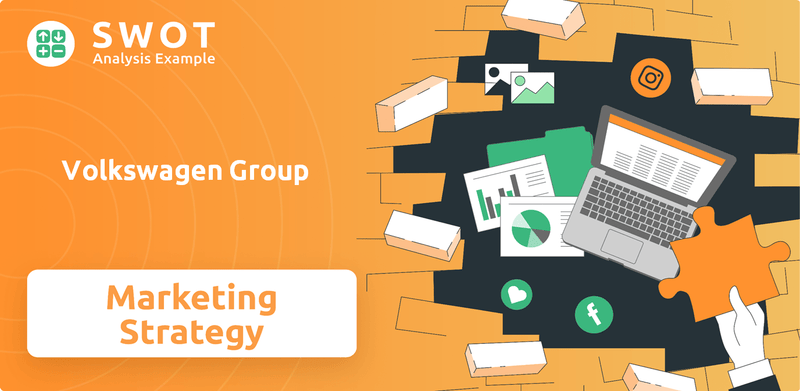
From its historical roots to its current transformation, Volkswagen Group has consistently redefined its Volkswagen Group SWOT Analysis to meet evolving consumer demands. Understanding the nuances of its Volkswagen sales strategy and Volkswagen marketing strategy is crucial for investors, analysts, and anyone interested in the future of the automotive industry. This comprehensive analysis will examine the key campaigns, brand positioning, and digital initiatives driving Volkswagen's growth and market presence, providing actionable insights into its ongoing evolution.
How Does Volkswagen Group Reach Its Customers?
The sales strategy of the Volkswagen Group centers on a multi-channel approach, combining traditional dealerships with digital platforms to reach a broad customer base. This strategy is designed to enhance customer experience and drive sales across various markets. The company's focus on both physical and digital channels reflects its commitment to adapting to evolving consumer preferences and market trends.
Volkswagen Group's sales strategy leverages its extensive network of dealerships, which provide in-person consultations, test drives, and after-sales services. Simultaneously, the company is investing heavily in digital channels, including e-commerce platforms, to offer customers convenient online purchasing options. This dual approach aims to cater to diverse customer needs and preferences, ensuring a seamless buying experience.
Supporting these sales efforts, Volkswagen Financial Services offers leasing, banking, and insurance services. In 2024, these financial services generated an operating profit of EUR 3.0 billion, contributing significantly to the Group's financial performance. This integrated approach, combining vehicle sales with financial services, enhances customer loyalty and provides additional revenue streams.
The cornerstone of Volkswagen Group's sales strategy includes a vast network of dealerships. These locations provide in-person sales support, test drives, and after-sales services. This traditional channel remains crucial for building customer relationships and providing comprehensive support.
Volkswagen Group is increasing its focus on digital platforms, including e-commerce sites. These platforms enable customers to browse and purchase vehicles, parts, and digital services online. The company is using digital channels to improve customer experience and expand its market reach.
Volkswagen Financial Services offers leasing, banking, and insurance activities. This supports vehicle sales and provides additional revenue streams. In 2024, this segment generated a significant operating profit.
Strategic partnerships are crucial for expanding market share and growth. Collaborations like the joint venture with SAIC Motor in China and Rivian in North America support the company's goals. These partnerships enhance market presence and accelerate innovation.
Volkswagen Group's Volkswagen sales strategy includes significant investments in digitalization and strategic partnerships to enhance its market position. The company is also heavily focused on electric vehicle (EV) sales, with an 88% increase in order intake for all-electric vehicles in Western Europe in FY 2024. This demonstrates the company's commitment to the EV market and its ability to adapt to changing consumer preferences.
- Digitalization: Investing in e-commerce platforms and digital customer experiences.
- Partnerships: Collaborating with SAIC Motor and Rivian to expand market reach and innovation.
- Electrification: Focusing on increasing EV sales and expanding its EV offerings.
- Financial Services: Leveraging Volkswagen Financial Services to support sales and generate revenue.
Volkswagen Group SWOT Analysis
- Complete SWOT Breakdown
- Fully Customizable
- Editable in Excel & Word
- Professional Formatting
- Investor-Ready Format
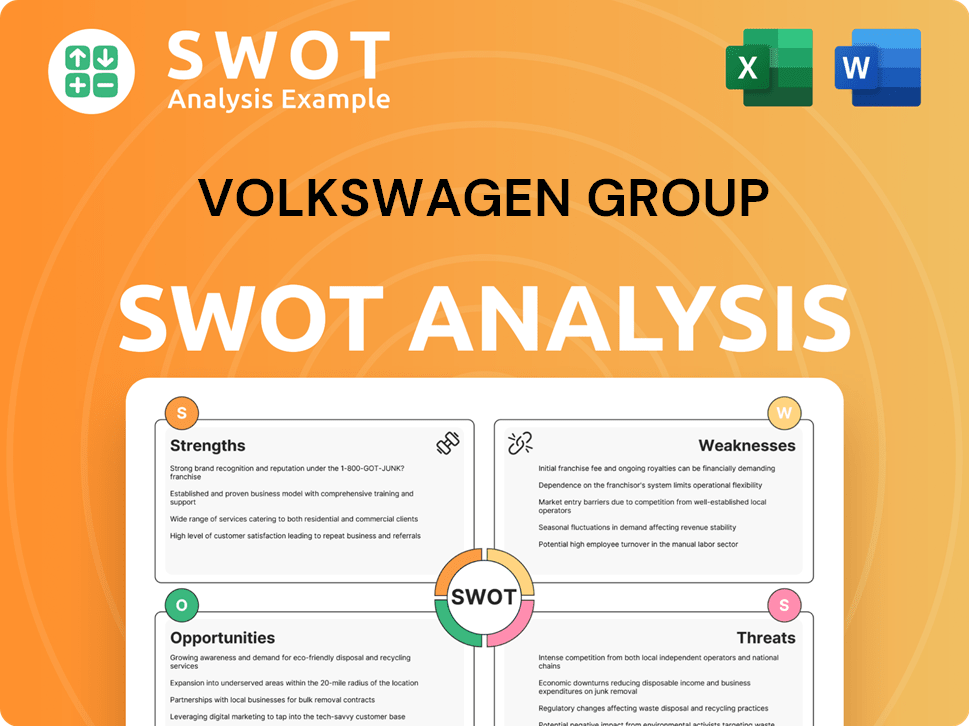
What Marketing Tactics Does Volkswagen Group Use?
The Volkswagen Group employs a comprehensive marketing strategy that blends digital and traditional tactics to boost brand awareness, generate leads, and drive sales. This approach is data-driven, focusing on customer segmentation and personalization to tailor messages and offerings effectively. The company continuously refines its brand profiles and differentiates between customer segments served by various brands to achieve high market saturation and minimize brand cannibalization.
In the digital sphere, the company uses content marketing, SEO, paid advertising, email marketing, and social media. A notable innovation in 2024 was the integration of generative AI, specifically ChatGPT, into its IDA voice assistant across several models, including the ID. family, Golf, Tiguan, and Passat. This enhancement improves the in-car experience through advanced voice control and access to an extensive knowledge base, thereby improving customer support and personalized information.
Traditional media, such as TV, radio, and print advertising, remain important for broad reach and targeting specific demographics. For instance, traditional print media is used to connect with generations that have a nostalgic connection to certain models. The company also engages in events, such as the 'Volkswagen Experiences' initiative launched in India in April 2024, offering expeditions and drives to boost customer engagement and brand loyalty. The Growth Strategy of Volkswagen Group provides additional context on the company's overall approach.
The digital marketing strategy includes content marketing, SEO, and paid advertising. These tactics are designed to reach a broad audience and drive traffic to the company's website.
Integration of ChatGPT into the IDA voice assistant in models like ID. family, Golf, Tiguan, and Passat. This enhances the in-car experience with advanced voice control and access to an extensive knowledge base.
Traditional media channels, such as TV, radio, and print advertising, are still used. Print media is used to target specific demographics with a nostalgic connection to certain models.
Initiatives like 'Volkswagen Experiences' in India offer expeditions and drives. These events are designed to boost customer engagement and build brand loyalty.
The company uses customer segmentation and personalization. This data-driven approach tailors messages and offerings to specific customer segments.
The company's software house, CARIAD, aims for 60% in-house software development by 2025. This will enhance the customer experience and create new revenue streams.
The Volkswagen Group's marketing strategy focuses on a multi-channel approach, utilizing both digital and traditional methods to reach a wide audience. This includes a strong emphasis on data-driven insights to personalize customer experiences and optimize campaigns for maximum impact. The company's goal is to enhance brand awareness and drive sales through strategic marketing initiatives.
- Digital Marketing: Content marketing, SEO, paid advertising, email marketing, and social media.
- AI Integration: Use of ChatGPT in the IDA voice assistant for improved in-car experience.
- Traditional Media: TV, radio, and print advertising to reach specific demographics.
- Customer Engagement: Events and experiences to build brand loyalty.
- Data-Driven Approach: Customer segmentation and personalization for tailored messaging.
- Technological Advancement: CARIAD's in-house software development for enhanced customer experience.
Volkswagen Group PESTLE Analysis
- Covers All 6 PESTLE Categories
- No Research Needed – Save Hours of Work
- Built by Experts, Trusted by Consultants
- Instant Download, Ready to Use
- 100% Editable, Fully Customizable
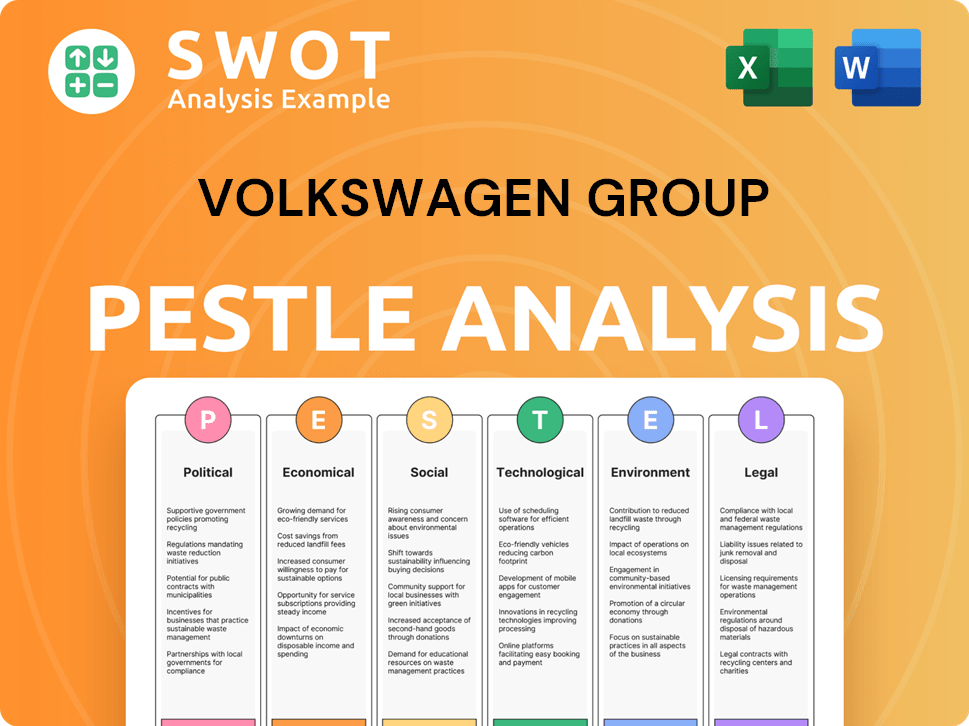
How Is Volkswagen Group Positioned in the Market?
The Volkswagen Group strategically positions its diverse brand portfolio to cater to distinct customer segments. This approach allows the company to differentiate itself from competitors in the automotive industry. The core message across the Group often revolves around innovation, sustainable mobility, and electric vehicle development, particularly through its 'New Auto' strategy.
Each brand within the Volkswagen Group, such as Volkswagen, Audi, Porsche, Škoda, and SEAT, maintains a unique identity. This includes its visual aesthetic and tone of voice, appealing to specific target audiences. The focus is on luxury (Audi, Porsche), value (Škoda, SEAT), or a blend of innovation and practicality (Volkswagen).
The company emphasizes customer satisfaction and loyalty, measuring these at various contact points. The goal is to foster an emotional connection with its brands. In 2024, Volkswagen Passenger Cars maintained an industry-leading conquest rate, while Audi, Škoda, and SEAT brands improved their conquest rates, and Porsche's figures remained stable.
The Volkswagen Group aims to be 'The Global Automotive Tech Driver.' This vision underpins its brand positioning. It is supported by significant investments in electric vehicle platforms like the MEB and the upcoming Scalable Systems Platform (SSP) from 2026.
Consistency across channels and touchpoints is maintained through integrated digital distribution systems. The focus is on delivering a unified customer experience. This approach is crucial for effective car sales and building brand loyalty.
The company actively responds to shifts in consumer sentiment, particularly regarding sustainability. Volkswagen is committed to reducing the carbon footprint of its passenger cars and light commercial vehicles by 30% per vehicle by 2030, without offset measures.
The Volkswagen ID. Buzz electric van being named one of TIME's Best Inventions of 2024 highlights VW's leadership in electrification and future-forward design. This reinforces its brand image and supports its electric vehicle marketing strategy.
Volkswagen Group Business Model Canvas
- Complete 9-Block Business Model Canvas
- Effortlessly Communicate Your Business Strategy
- Investor-Ready BMC Format
- 100% Editable and Customizable
- Clear and Structured Layout
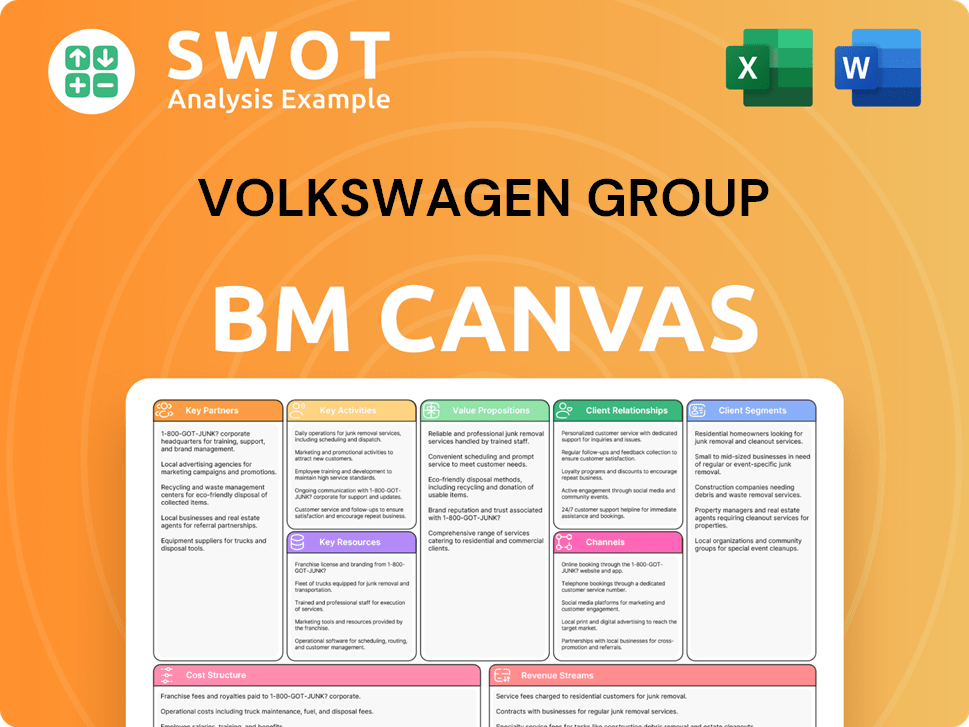
What Are Volkswagen Group’s Most Notable Campaigns?
The Volkswagen Group consistently launches impactful sales and marketing campaigns to bolster its brand presence and drive market expansion. These initiatives are central to the company's Revenue Streams & Business Model of Volkswagen Group, focusing on both product-specific promotions and broader customer experience enhancements. The company's strategic approach combines aggressive e-mobility pushes with innovative customer engagement programs, demonstrating a commitment to adapting to evolving market demands and technological advancements.
A key element of the Volkswagen sales strategy involves a strong emphasis on electric vehicles (EVs). The company is committed to launching over 70 EV models by 2030. Supporting this transition, the company plans to establish approximately 45,000 high-power charging points across Europe, China, and the USA by 2025. This strategic investment in infrastructure aims to facilitate the adoption of EVs and enhance the customer experience, which is critical for the Volkswagen marketing strategy.
The success of the Volkswagen Group's marketing efforts is evident in its sales performance. For instance, in 2024, the company saw an 88% increase in order intake for all-electric vehicles in Western Europe. In the US, Volkswagen of America reported a 15.2% year-over-year sales increase in 2024, outperforming the industry's approximate 2% growth rate. These figures highlight the effectiveness of the company's integrated sales and marketing campaigns in driving growth across different markets.
The company is aggressively expanding its electric vehicle offerings. This includes launching over 70 EV models by 2030 and investing in charging infrastructure. This initiative aims to capitalize on the growing demand for electric vehicles and maintain a competitive edge in the automotive market.
The company enhances customer engagement through unique experiences and technological integrations. This includes events like 'Volkswagen Experiences' in India and the integration of generative AI into its 'myVW' app. These efforts aim to boost customer loyalty and improve the overall ownership experience.
The Volkswagen Group focuses on marketing specific models, like the Jetta and Tiguan, with targeted promotions. These campaigns highlight key features and benefits to attract potential buyers. This strategy is crucial for driving sales and maintaining strong brand performance.
The company acknowledges and celebrates its partners through events like the 'Volkswagen Group Award 2024'. This event recognizes outstanding collaboration and shared success. This helps to strengthen relationships and foster a collaborative environment.
These campaigns highlight the Volkswagen Group's commitment to innovation and customer satisfaction. The company's focus on electric vehicles, customer experience, and strategic partnerships drives sales and enhances brand loyalty. These efforts contribute to the company's overall market performance and long-term growth.
- Aggressive e-mobility push with over 70 EV models by 2030.
- Expansion of charging infrastructure with approximately 45,000 high-power charging points by 2025.
- 15.2% year-over-year sales increase in the USA in 2024.
- Launch of 'Volkswagen Experiences' in India for enhanced customer engagement.
- Integration of generative AI in the 'myVW' app to improve customer support.
- Recognition of partners through the 'Volkswagen Group Award 2024'.
Volkswagen Group Porter's Five Forces Analysis
- Covers All 5 Competitive Forces in Detail
- Structured for Consultants, Students, and Founders
- 100% Editable in Microsoft Word & Excel
- Instant Digital Download – Use Immediately
- Compatible with Mac & PC – Fully Unlocked
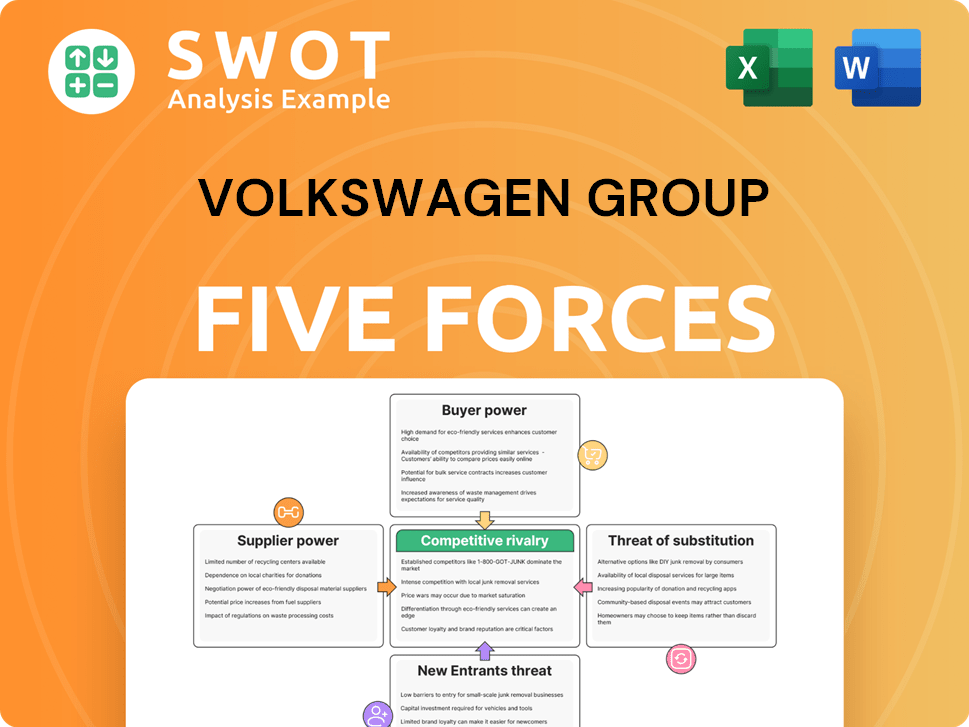
Related Blogs
- What are Mission Vision & Core Values of Volkswagen Group Company?
- What is Competitive Landscape of Volkswagen Group Company?
- What is Growth Strategy and Future Prospects of Volkswagen Group Company?
- How Does Volkswagen Group Company Work?
- What is Brief History of Volkswagen Group Company?
- Who Owns Volkswagen Group Company?
- What is Customer Demographics and Target Market of Volkswagen Group Company?
Disclaimer
All information, articles, and product details provided on this website are for general informational and educational purposes only. We do not claim any ownership over, nor do we intend to infringe upon, any trademarks, copyrights, logos, brand names, or other intellectual property mentioned or depicted on this site. Such intellectual property remains the property of its respective owners, and any references here are made solely for identification or informational purposes, without implying any affiliation, endorsement, or partnership.
We make no representations or warranties, express or implied, regarding the accuracy, completeness, or suitability of any content or products presented. Nothing on this website should be construed as legal, tax, investment, financial, medical, or other professional advice. In addition, no part of this site—including articles or product references—constitutes a solicitation, recommendation, endorsement, advertisement, or offer to buy or sell any securities, franchises, or other financial instruments, particularly in jurisdictions where such activity would be unlawful.
All content is of a general nature and may not address the specific circumstances of any individual or entity. It is not a substitute for professional advice or services. Any actions you take based on the information provided here are strictly at your own risk. You accept full responsibility for any decisions or outcomes arising from your use of this website and agree to release us from any liability in connection with your use of, or reliance upon, the content or products found herein.